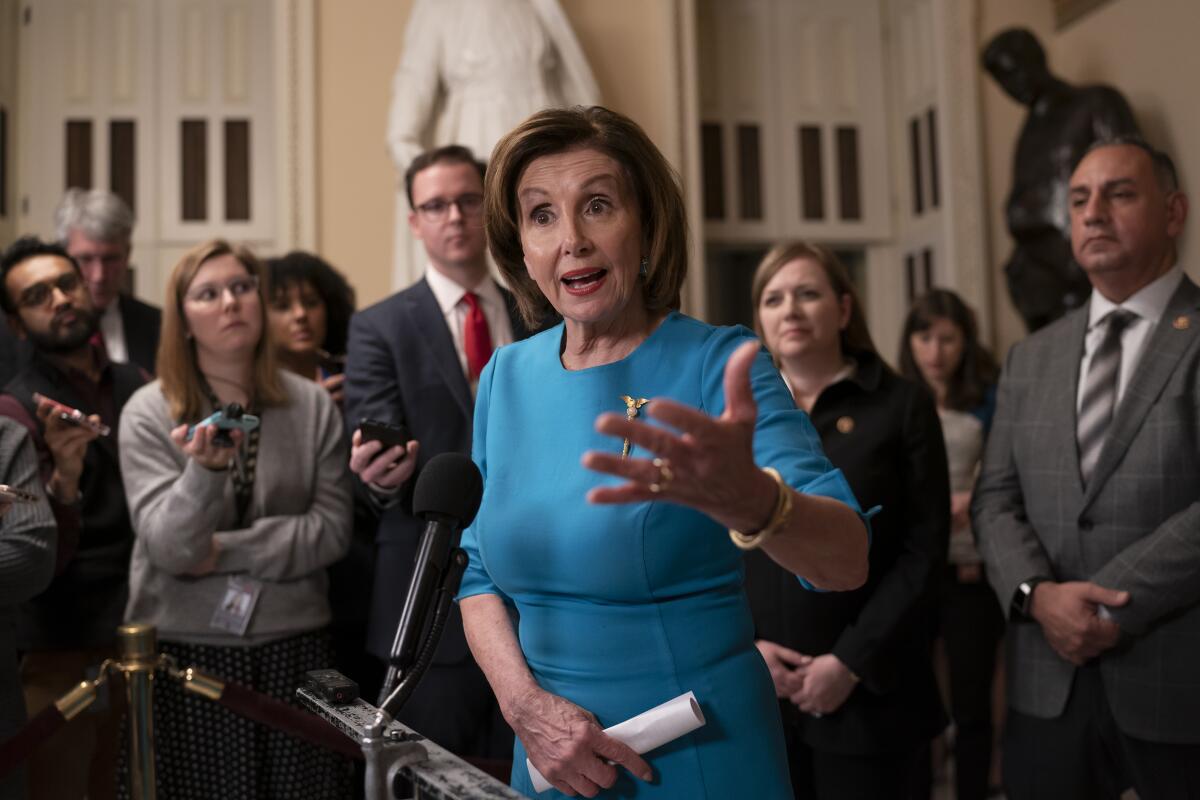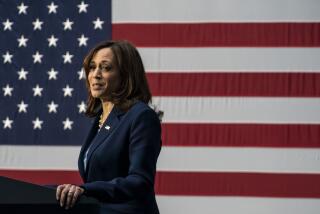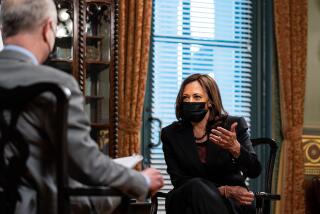House passes aid bill after Trump declares coronavirus emergency

- Share via
WASHINGTON — The House approved legislation early Saturday to provide direct relief to Americans suffering physically, financially and emotionally from the coronavirus pandemic.
President Trump on Friday declared the outbreak a national emergency, freeing up money and resources to fight it, then threw his support behind the congressional aid package.
From the White House Rose Garden, Trump said, “I am officially declaring a national emergency,” unleashing as much as $50 billion for state and local governments to respond to the crisis.
Trump also announced a range of executive actions, including a public-private partnership to expand coronavirus testing capabilities with drive-through locations, as the government tries to subdue the outbreak whose spread is roiling markets, closing institutions and disrupting the lives of Americans.
But he denied any responsibility for delays in making testing available as his administration has come under criticism for being too slow to respond.
Trump said, “I don’t take responsibility at all” for the slow rollout of testing.
As the House prepared to vote late Friday, Speaker Nancy Pelosi (D-San Francisco) trumpeted the hard-fought package that will provide free testing, sick pay for workers, enhanced unemployment benefits and bolstered food programs.
“We did what we said we were going to do: Put families first,” said Pelosi, flanked by Democratic lawmakers, including many freshmen. The House passed the bill after midnight in the Capitol on an overwhelming bipartisan vote, 363-40. It now goes to the Senate.
Trump’s tweet of approval Friday instilled fresh energy in the package, all but ensuring that wary Republicans would join with a robust vote.
“I encourage all Republicans and Democrats to come together and VOTE YES!” Trump wrote, “Look forward to signing the final Bill, ASAP!”
The crush of late-day activity capped a tumultuous week in Washington as the fast-moving virus left ordinary Americans suddenly navigating self-quarantines, school closures and a changed way of life.
The White House was under enormous pressure, dealing with the crisis on multiple fronts as it encroached ever closer on the president.
Trump has been known to flout public health advice — and was eagerly shaking hands during the more than hourlong afternoon event — but acknowledged he “most likely” will be tested soon after exposures to people who have tested positive for the virus. The White House physician indicated later his interactions were low-risk and testing was not necessary.
Trump said officials don’t want people taking the test unless they have certain symptoms. “We don’t want people without symptoms to go and do that test,” he said. “It’s totally unnecessary.”
Additionally, the president took a number of other actions to bolster energy markets, ease the financial burden for Americans with student loans and give medical professionals additional “flexibility” in treating patients during the public health crisis.
“Through a very collective action and shared sacrifice, national determination, we will overcome the threat of the virus,” Trump said.
Central to the aid package from Congress, which builds on an emergency $8.3-billion measure approved last week, are the free testing, sick pay and family leave provisions.
Providing sick pay for workers is a crucial element of federal efforts to stop the rapid spread of the infection. Officials warn that the nation’s healthcare system could quickly become overwhelmed with very sick patients, as suddenly happened in Italy, one of the countries hardest hit by the virus.
The ability to ensure paychecks will keep flowing — for people self-quarantining or caring for others — can help assure Americans they will not fall into financial hardship. The legislation also offers three months of paid family and medical leave. Small and mid-size employers will be reimbursed through tax credits.
Pelosi negotiated the deal with Treasury Secretary Steven T. Mnuchin in days of around-the-clock negotiations with crosstown phone calls, even as Trump was speaking at the White House.
Voting in the Senate is not yet set, with senators out of town for the weekend. But Majority Leader Mitch McConnell (R-Ky.) canceled a planned recess week and senators were scheduled to return Monday. He said he expects most senators will want to “act swiftly.”
Both Mnuchin and Pelosi, who said she did not speak directly to Trump during the negotiations, promised a third coronavirus package would follow soon, with more aggressive steps to boost the U.S. economy, which economists fear has already slipped into recession.
The financial markets closed on an upswing after one of the worst nosedives since the 1987 downturn.
For most people, the new coronavirus causes only mild or moderate symptoms, such as fever and cough. For some, especially older adults and people with existing health problems, it can cause more severe illness, including pneumonia.
The vast majority of people recover. According to the World Health Organization, people with mild illness recover in about two weeks, while those with more severe illness may take three to six weeks to be over it.
Trump said he was gratified that Brazilian President Jair Bolsonaro tested negative for the virus, after the pair sat next to each other for an extended period of time last weekend at Trump’s Mar-a-Lago club in Florida. A senior aide to Bolsonaro tested positive.
The White House physician said in a memo late Friday that Trump was also exposed to a second guest at the club dinner, “sharing the table with the president,” who has since tested positive for the virus. Still, despite the incidents, the physician said Trump had only “LOW risk” interactions and testing “is not currently indicated.”
Trump’s daughter and senior advisor Ivanka Trump worked from home Friday after meeting with Australian Home Affairs Minister Peter Dutton, now in isolation at a hospital after testing positive for the coronavirus. White House spokesman Judd Deere said she was evaluated by the White House medical unit.
Atty. Gen. William Barr, who also met with the Australian official, stayed home Friday, though he “felt great and wasn’t showing any symptoms,” his spokeswoman, Kerri Kupec, said.
Several lawmakers, including some close to Trump, have also been exposed to people who tested positive for the virus and are self-isolating.
Among them are Republican Sens. Lindsey Graham of South Carolina and Rick Scott of Florida, who were at Trump’s club over the weekend. Graham announced Friday that he also met with the Australian official who has tested positive. And GOP Sen. Ted Cruz of Texas, who had previously isolated himself after a potential exposure at a conservative conference in Washington, said Friday he met with a Spanish official and is now self-quarantining.
Hospitals welcomed Trump’s emergency declaration, which they and lawmakers in Congress had been requesting. It allows the Health and Human Services Department to temporarily waive certain federal rules that can make it harder for hospitals and other healthcare facilities to respond to an emergency.
The American Medical Assn. said the emergency declaration would help ensure America’s healthcare system has sufficient resources to properly respond to the ongoing outbreak.
Dr. Anthony Fauci, infectious disease chief at the National Institutes of Health, said more tests would be available over the next week but warned, “We still have a long way to go.”
The Associated Press receives support for health and science coverage from the Howard Hughes Medical Institute’s Department of Science Education. The AP is solely responsible for all content.
More to Read
Get the L.A. Times Politics newsletter
Deeply reported insights into legislation, politics and policy from Sacramento, Washington and beyond. In your inbox twice per week.
You may occasionally receive promotional content from the Los Angeles Times.










